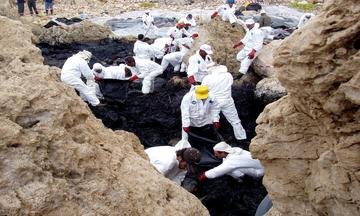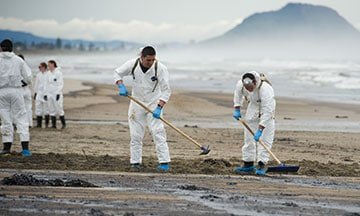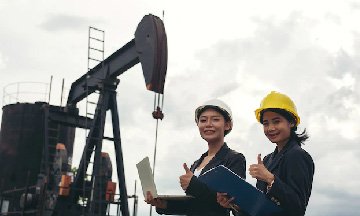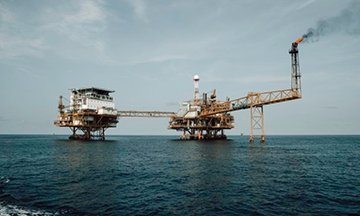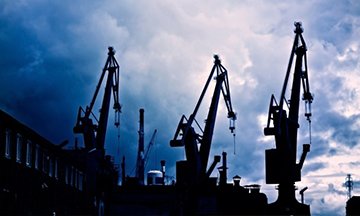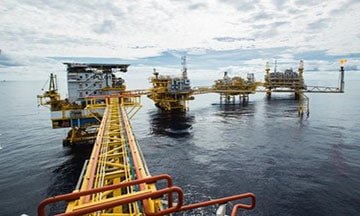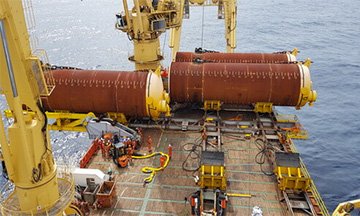Oil Spill Clean up Methods, Response and Models (Supervisory Level)
| Date | Format | Duration | Fees | |
|---|---|---|---|---|
| 01 May - 03 May, 2024 | Live Online | 3 Days | $1750 | Register |
| 17 Jun - 21 Jun, 2024 | Live Online | 5 Days | $2250 | Register |
| 01 Jul - 12 Jul, 2024 | Live Online | 10 Days | $4495 | Register |
| 09 Sep - 13 Sep, 2024 | Live Online | 5 Days | $2250 | Register |
| 25 Nov - 06 Dec, 2024 | Live Online | 10 Days | $4495 | Register |
| 22 Dec - 26 Dec, 2024 | Live Online | 5 Days | $2250 | Register |
| Date | Venue | Duration | Fees | |
|---|---|---|---|---|
| 27 May - 29 May, 2024 | Dubai | 3 Days | $3950 | Register |
| 03 Jun - 07 Jun, 2024 | London | 5 Days | $5695 | Register |
| 03 Jun - 07 Jun, 2024 | Dubai | 5 Days | $4750 | Register |
| 22 Jul - 02 Aug, 2024 | Dubai | 10 Days | $8775 | Register |
| 05 Aug - 09 Aug, 2024 | Dubai | 5 Days | $4750 | Register |
| 09 Sep - 13 Sep, 2024 | Dubai | 5 Days | $4750 | Register |
| 23 Sep - 27 Sep, 2024 | London | 5 Days | $5695 | Register |
| 28 Oct - 01 Nov, 2024 | Dubai | 5 Days | $4750 | Register |
| 11 Nov - 22 Nov, 2024 | Windhoek | 10 Days | $9150 | Register |
| 18 Nov - 22 Nov, 2024 | Dubai | 5 Days | $4750 | Register |
| 08 Dec - 12 Dec, 2024 | Doha | 5 Days | $4950 | Register |
| 23 Dec - 27 Dec, 2024 | Dubai | 5 Days | $4750 | Register |
Course Overview
Oil spills are one of the most dangerous and devastating marine accidents. The severe damage and losses they cause to marine life and the marine environment make it mandatory for all marine organisations to follow certain guidelines and standards of operation to prevent such accidents.
In the event of oil spills, marine organisations need to pay hefty penalties towards the serious damage caused by the spill. Managers and supervisors at marine vessels, terminals and/or jetties understand the complexity of oil spill management, and hence, certain critical aspects of decision making and action are left to their discretion.
While on-scene commanders are responsible for taking the first steps and action at the site, managers and supervisors are responsible for decision making based on the information and details received from the on-scene commander. Managers and supervisors take into account the situation, international regulations and requirements as well as political and media interference.
They are also responsible for assessing legal and financial implications and taking the necessary steps in that direction. Various oil spill models are helpful and influence the decision and approach adopted by managers and supervisors for the future course of action. Oil spill models are essential elements in contingency planning and preparing effective response strategies to combat hazardous oil spills at sea.
To track or map the future course of a spill, these models depend on the ability to predict meteo-marine conditions of the sea through the atmospheric, wave and hydrodynamic numeric models, together with the information on location, rate, nature and characteristics of the spill.
Numeric model activities can be automated and run in the operational mode for round-the-clock service in civil protection agencies or for maritime authorities to quickly intervene to control impact. Some well-known models used are MOTHY, MEDSLIK, MEDSLIK-II and POSEIDON-OSM. Thus, managers and supervisors have a very critical role to play in prompt decision making to minimise the impact of oil spills.
This Zoe training course will empower you with a complete understanding of oil spills and detailed information about oil spill models. Further, this course will provide clarity related to the responsibilities of supervisors during oil spills. This will help those at the supervisory level understand their roles better and fulfil their responsibilities completely.
On the other hand, those at junior levels will foresee what is expected of them to progress to the next level and can accordingly invest efforts in that direction. This course is an advanced step into managing oil spills not just at the site but even remotely, making decisions and taking action based on reports and data received from the site and after considering legal, financial, political and other implications.
Course Objectives
The main objective of this Oil Spill Clean up Methods, Response and Models (Supervisory Level) course is to empower managers and supervisors and other marine professionals with—
- Advanced knowledge and information about oil spills and resultant action or next steps based on records and data received from the site of the spill
- The knowledge and ability to comprehend and draw accurate conclusions based on information and data provided through records
- Better analytical and decision-making skills to be able to make correct decisions without seeing the state or damage caused by the oil spill incident
- The required confidence and skill to work with advanced tools and techniques, including oil spill models, to gather the required information to take appropriate next steps
- The clarity to understand the roles and responsibilities at the supervisory level to ensure that there is no delay in decision making that could amplify the damage at the site
- The skill and experience to ensure seamless communication between on- and off-site locations in order to reduce the impact of oil spills or to prevent warning ones
- The overall confidence, experience, knowledge and ability to successfully manage an oil spill end to end and minimise the impact it can cause to marine life or the losses it can cause to the business
- The needed experience and exposure to prepare for higher levels of responsibility in order to ensure steady and successful career growth and progression in the organisation
Training Methodology
All training courses at Zoe Talent Solutions are created with scope for some changes as per the training audience and their experience and background. Trainers appointed to deliver the training are experts in the specific domain, who deliver the training with the help of audio-visual presentations to garner trainee attention.
The trainer also encourages trainee participation through group activities, debates and role-plays. Practical experiences of trainees are also discussed in detail and related to the topic of discussion.
Like all Zoe Talent Solutions courses, this course follows the Do-Review-Learn-Apply Model.
Organisational Benefits
Organisations whose employees attend this course will benefit in the following ways:
- Better trained supervisors to effectively manage communication and action during an oil spill so as to minimise the damage it can cause
- Greater awareness of oil spill management and the overall damaging impact of these accidents
- Use of advanced numeric models to not only handle the oil spill at the site but also track its future path as well as control damage and take action accordingly
- Reduced costs and business loss that could have been incurred for penalties and liabilities for life or property losses
- Better risk assessment and management
- The clarity in terms of each role’s responsibilities and ownership, in turn, ensuring seamless communication and activity for quick decision making and resolution
- More professional and informed strategic and tactical decision making
- Economic growth because of better risk management and timely action in the event of marine accidents
We have an extensive list of Project Management Courses that can be very beneficial for team leaders and managers, please click the link to visit PROJECT MANAGEMENT Courses Category
Personal Benefits
Marine professionals, particularly those at supervisory levels, attending this course will benefit in the following ways:
- Greater knowledge of advanced numeric models and enhanced skill to work with them to manage oil spills and prevent damage
- Increased ability to make tactical and strategic decisions
- Increased clarity of the roles and responsibilities at the supervisory level to fulfil one’s duties completely and to satisfaction
- Increased confidence and experience to remotely manage an oil spill or any other marine accident effectively
- Greater knowledge, confidence and capabilities to work with advanced tools and techniques for automating and safely managing on- and off-site operations
- A greater understanding of records and how to accurately interpret the data within to be able to take correct decisions and decide appropriate next steps
- Enhanced skill set and confidence to take up more complex roles and responsibilities and fulfil them to satisfaction
Who Should Attend?
- Senior managers and officers who play a role in decision making in the event of marine accidents
- Site supervisors and offsite supervisors who are responsible for deciding the next steps
- On-scene commanders who need to coordinate with supervisors for certain aspects of their role to effectively manage an oil spill
- Non-supervisory staff and response team members who would like to hone their skills and work to build capabilities to take up supervisory roles in future
- Recordkeepers and interpreters responsible for deriving accurate information through records to decide appropriate next steps
- Legal officers and auditors who get involved in case of any legal implications to the incident
- Safety managers and officers who are involved in maintaining safety at such locations
- Any other personnel who would be interested in knowing and understanding more about supervisory responsibilities
Course Outline
The course will cover the following areas critical to understanding oil spill management and the responsibilities of supervisors:
Module 1 – Responsibilities of On-Scene Commanders
- Activate the emergency response team
- Activate additional response vendors/contractors
- Evaluate severity, impact, safety measures, response requirements, etc.
- Confirm safety aspects at site
- Communicate and provide incident information
- Coordinate and complete internal/external notifications
- Communicate with the emergency response team
Module 2 – Responsibilities of Supervisors
- Initiate response actions
- Restrict site access
- Take steps to minimise health and safety impact
- Request medical assistance
- Verify leakage and damage
- Identify and isolate the source, if possible
- Interpret the results of numeric models and reports
- Evaluate and take action on legal, financial and political implications
- Coordinate further response actions with on-scene commanders
Module 3 – Clean-Up Methods
- Bioremediation
- Bioremediation accelerators
- Controlled burning
- Dispersants
- Dredging
- Skimming
- Solidifying
- Vacuum and centrifuge
- Beach raking
Module 4 – Clean-Up Equipment
- Booms
- Skimmers
- Sorbents
- Chemical and biological agents
- Vacuums
- Shovels
Module 5 – Elements of the Spill Response Procedure
- List of appropriate protective clothing, safety equipment and clean-up
- Appropriate evacuation zones
- Availability of fire suppression equipment
- Disposal containers for spill clean-up material
- First-aid material and procedures
Module 6 – Environmental Sensitivity Index (ESI) Mapping
- Definition
- Advantages
- Information categories
- Shoreline type
- Biological resources
- Human-use resources
Module 7 – Oil Spill Models
- Definition
- Characteristics
- Advantages
- Functions
Module 8 – Types of Oil Spill Models
- MOTHY
- MEDSLIK
- MEDSLIK-II
- POSEIDON-OSM
Module 9 – Other Aspects of Important Consideration
- Contingency planning
- Legal and regulatory framework
- Response operations
- Liability handling
- Risk assessment and management
- Role/influence of government and media
General Notes
- All our courses can be facilitated as Customized In-House Training course.
- Course duration is flexible and the contents can be modified to fit any number of days.
- As for Open Enrolment Courses, we offer our clients the flexibility to chose the location, date, and time and our team of experts who are spread around the globe will assist in facilitating the course.
- The course fee includes facilitation, training materials, 2 coffee breaks, buffet lunch and a Certificate of successful completion of Training.
- FREE Consultation and Coaching provided during and after the course.
